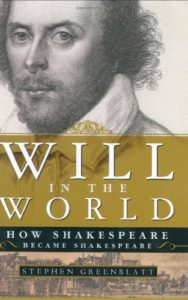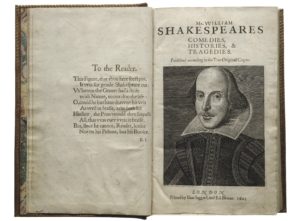The Wall Street Journal reports that the Oregon Shakespeare Company is getting translations of all of Shakespeare’s plays to make them more comprehensible. Why? According to a Columbia University professor:
Most educated people are uncomfortable admitting that Shakespeare’s language often feels more medicinal than enlightening. We have been told since childhood that Shakespeare’s words are “elevated” and that our job is to reach up to them, or that his language is “poetic,” or that it takes British actors to get his meaning across.
Most? Medicinal? I’m not sure where these people grew up or went to school, but I never heard any of this in New York where I saw lots of Shakespeare with American actors. I read him from an early age and learned that whatever was difficult on the page melted away in performance thanks in part to the production: lighting, sets, costumes, music. And it didn’t matter if that was live or on film.
When I took acting classes in college, I saw Shakespeare from the inside and understood how important a job it was for the director and the actors to make the play clear to the audience. The WSJ writer seems to think that a line like this from Polonius’s speech to Laertes in Hamlet needs translating: “These few precepts in thy memory / Look thou character.” Why? Because Shakespeare used “character” as a verb for “write.” If an actor old enough to play Polonius can’t make it obvious through his voice and gestures that he’s telling his son to mark his words, then he shouldn’t be acting.
Attending the Stratford Festival in Ontario for years and meeting their directors and many actors, I learned how much plays are cut to make that more possible. And how setting plays in different periods can give an audience visual cues to comprehend the action and text more readily. A play is never just the spoken words, as the WSJ author seems to think. Everything on stage carries meaning.
The author of the WSJ article says plays will only be 10% translated (will there be a Translation Meter?). But I don’t just go to a Shakespeare play to see it, I also want to hear it, enjoy Shakespeare’s word play, the rhyme, the rhythm, the assonance. Yes, I like the poetry, even though I don’t remotely think it elevates me. It’s entertaining, it’s beautiful music, its Shakespeare.
Why should some tin-eared scholar be making decisions about what people do or don’t understand, rewriting great poetry and spoon-feeding them Shakespeare Lite?
Lev Raphael is the author of 25 books in genres from memoir to mystery, available on Amazon.






